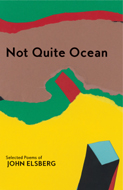 John Elsberg
John Elsberg
Not Quite Ocean: Selected Poems of John Elsberg (Constance M. Elsberg, Editor)
Paycock Press
Reviewer: Richard Allen Taylor
Not Quite Ocean celebrates the poetry of John Elsberg (1945-2012), a poet, editor, and historian who authored over a dozen poetry books and chapbooks and served as editor or associate editor of various literary magazines, including Gargoyle, Bogg, The Delmarva Review, and Delaware Poetry Review.
Elsberg’s poetry—in this collection, at least—traffics in personal meditations in which nature, place, and people take center stage, with little or no attention to politics, social issues, or pop culture. In “Undercurrents,” for example, the scene unfolding is one of a woman nursing a child while gazing out the window at skaters on a frozen lakes
. . .with fewer hopes
than just a year
or two before, she watches
the skaters go round
in soothing patterns
of movement lost
to her now. They build
a fire near the ice,
a fire to keep
the night for skating,
and as the flames
take hold, she sees
reflected on the banks
the white undercurrents
that sustain her
almost against her will:
snow becoming milk,
wide in soft curves.
The plain language, compact lines, gentle rhythms, aggressive enjambments, and mastery of tone typify Elsberg’s style. Stripped down to its essential elements, uncluttered by adornment, the poem manages to connect character with scene and reader with character in a profound and elegant way. We don’t know why the woman in the poem is less hopeful than before, but we sense her melancholy and understand on a primordial level that she finds solace in the physical act of breastfeeding amid the soothing tempos of the circling skaters.
Several of these poems are about Elsberg’s father. “Sailor” delivers an affectionate portrait and provides an inside look at the father/son relationship: “My father is a sailor. Told me / stories of all places, long / ago, another world, where bright / mornings could be harbors, fast fists / a proud man….” We learn the father is an “engineer,” an “oiler,” a “fireman” (meaning one who fires the boilers) as well as a practical man, good with his hands; and that he “brought me [the author] up at a distance,” as the sailor was so often away at sea. Then, in an ironic twist, the sailor is home, the son is away:
Next summer, [my father] writes, come home, I’m
waiting. We’ll put a new roof on
together. And to his past, his care,
his silence, I will, with a longing.
Elsberg published many tankas, haikus, and haiku series over the course of his writing career, and those forms are well-represented in this volume. A representative tanka (titled “Tanka” in this volume) is shown here in its entirety:
summer heat
barn swallows sweeping low
in wide circles
a corner nest on the porch
we now share
Elsberg’s poetic meditations in general show very little clutter. I suspect that if he wrote about a Christmas tree (and he probably did, but not in this collection), he would show us far more about the tree and not much, if anything, about the ornaments. Unlike a great deal of poets writing today, he seldom brings his personal troubles to his poems. Yet, the poems are personal. The nature poems in particular seem mind-clearing, perhaps for both author and reader.
Of the haiku and haiku series found here, one of my favorites is the poem “In the Wake,” which contains ten haiku, all of which stand alone as individual poems but point back to a central theme—being at the beach. Any poet who, like me, has set up a folding canvas chair and sat down to write the quintessential beach poem will appreciate this:
brushing sand
from my notebook
no words on the page
So, what does a writer do when he asks himself, “What can I possibly say about the beach that hasn’t already been said?” Answer: Turn the chair around:
the Snake Brothers play
Temptation on the boardwalk
slender legs
Elsberg seems to be telling us, look around you. Don’t fixate on one thing. Notice everything.
In the other eight haiku of this series, he has a lot to say about the beach, sky, and ocean, but, aside from the one about the Snake Brothers, none contain any time markers—no telltale relics to hint when they were written. Although the editor, Connie Elsberg, states in the introduction that the poems are arranged in approximate chronological order, the absence of references to technology, fashion trends, entertainers, elected officials, politics, social movements, and so on makes it virtually impossible to peg most of these poems to any particular decade or even century. This is perhaps an effective move: as an experienced editor, Elsberg surely knew that omitting temporal clues is one way to render poems that have a “timeless” quality, avoiding obsolescence through reliance on topical allusions or popular themes.
My only criticism of this collection has nothing to do with the merits of the poems. I was surprised to find two poems in this volume that are alternate versions of other poems in the same book. Alternate versions are customarily not published within the same book. Perhaps it was done for a compelling reason, perhaps related to the nature of the project—a posthumous tribute to the author. Nevertheless, my preference would have been to read two different poems (I’m sure there were many that could have been chosen) rather than reading two poems that were substantially similar to their mates. This minor criticism aside, Not Quite Ocean gets my enthusiastic recommendation.
Out of space, but determined to highlight my favorite passage in this collection, I’ll end with this excerpt from “The End of Sleep,” which I find exceptionally eloquent:
the end of sleep
comes without a ladder
I meant to glaze
the stars for the moon to fire
but the moon said higher

